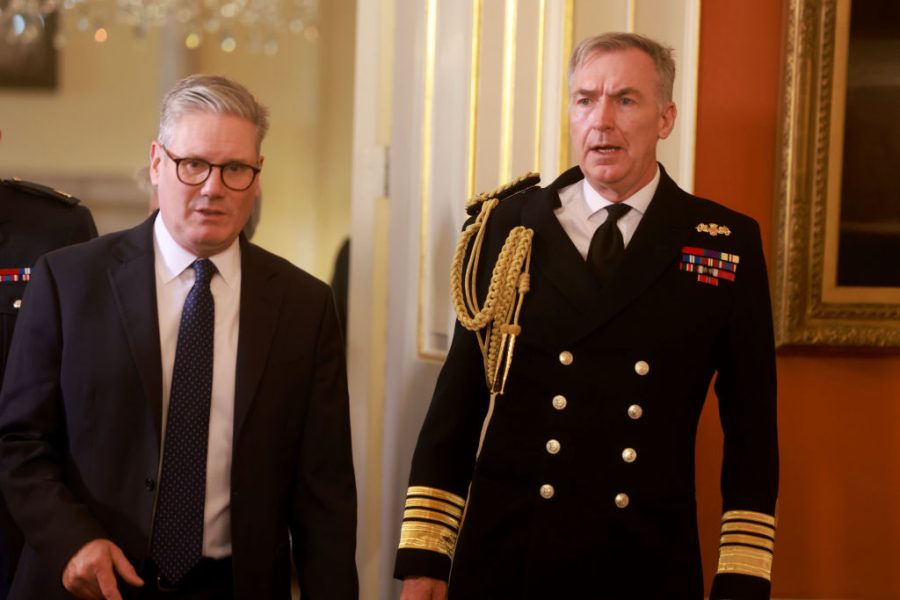On Wednesday, the Chief of the Defence Staff (CDS), Admiral Sir Tony Radakin, gave a speech to students at the People’s Liberation Army (PLA) National Defence University in Beijing. Take a moment to think about that.
Radakin also met General Liu Zhenli, chief of staff of the joint staff department of the Central Military Commission, the operational headquarters of the PLA. The Ministry of National Defence reported that:
The UK’s attitude towards China is already deeply confused
The two sides conducted in-depth exchanges on China-UK relations and mil-to-mil [military] relations, international and regional situations and issues of common concern, and had communication on strengthening exchanges and cooperation between the two militaries.
The UK Ministry of Defence did not publicise or comment on the visit. But there is something very strange about this episode. Radakin is the first chief of the defence staff to visit China since 2015, when General Sir Nicholas Houghton made the journey.
Those were, however, different times – the ‘golden age’ of Sino-British relations: the PLA navy’s 18th escort task group had visited HM Naval Base Portsmouth at the beginning of the year after an anti-piracy mission in the Gulf of Aden. The UK, meanwhile, was preparing for President Xi Jinping’s impending state visit that October. Britain had just joined the Asian Infrastructure Investment Bank, and was sizing up Shenzhen-based technology giant Huawei as a partner for its 5G mobile network.
We are in a different geopolitical world now. Huawei was excluded from the UK’s telecoms infrastructure in 2020 because of fears over national security. China, meanwhile, has forged closer ties with Vladimir Putin’s Russia since his invasion of Ukraine in 2022 and the Chinese military has increased pressure on Taiwan (formally the Republic of China, remember, tracing its ancestry back the first republican government in 1912). Beijing has sanctioned five Members of Parliament, including the deputy speaker of the House of Commons, and is actively engaged in espionage and cyber warfare in the UK.
So what is going on? The Chinese reports of Radakin’s visit have so far been standard CCP boilerplate material, painting a picture of close friendship and cooperation between the UK and China.
Philip Ingram, a former colonel in military intelligence and expert on security and defence, told me there were two possible explanations behind Radakin’s visit:
This is either a case of keeping your potential enemies close, or a very naive move given President Trump’s views on China – I hope it doesn’t come back to bite them. The Chinese have already exploited CDS’s presence in the information domain. The Ministry of Defence needs to give details quickly.
The UK’s attitude towards China is already deeply confused. Rishi Sunak’s government described the régime in Beijing as a ‘systemic challenge’, and his security minister, Tom Tugendhat, was regarded as a ‘hawk’ on Sino-British relations. In opposition, Labour supported a motion in the House of Commons which called China’s repression of the Uyghur population of Xinjiang ‘crimes against humanity and genocide’ and the shadow foreign secretary, David Lammy, promised to pursue legal avenues against the CCP.
Lammy and his colleagues have found government more demanding and nuanced than the chiaroscuro of performative opposition. On his appointment as Foreign Secretary, Lammy initiated an ‘audit’ of relations between the UK and China, but it has disappeared behind the ramparts of Whitehall, left behind by events. Lammy and the Chancellor of the Exchequer, Rachel Reeves, have both visited China and the Prime Minister met President Xi in the margins of November’s G20 summit in Rio de Janeiro last year. Britain needs trade and investment, and Sir Keir Starmer, due to visit China himself later in the year, has decided that takes priority over other considerations.
It is hard to see what the UK has gained from Radakin’s visit. In practical terms, it will have been inconvenient, since he and his staff will have had to be very circumspect in using communications technology while in China, and any diplomatic ‘gifts’ will have to be pulled apart for scrutiny. Beijing has already been allowed to create a narrative of the visit, so any messaging from the UK will seem reactive and flat-footed.
We would all like to think our leaders were strategic geniuses, taking on all comers in a fiercely complex tournament of four-dimensional chess. More often, alas, their approach is more like an indifferent cook, throwing spaghetti at a wall to see what sticks. The Chief of the Defence Staff did not stay long in the Far East, and by Thursday, was in Brussels with the Defence Secretary meeting colleagues from the ‘coalition of the willing’ to discuss Ukraine.
Perhaps there is leverage being created or exercised behind the scenes and Radakin’s extraordinary journey was a masterstroke. If I could gently offer the admiral a snippet of advice, though: if you think someone is being played, and you don’t know who it is – it’s you.








Comments